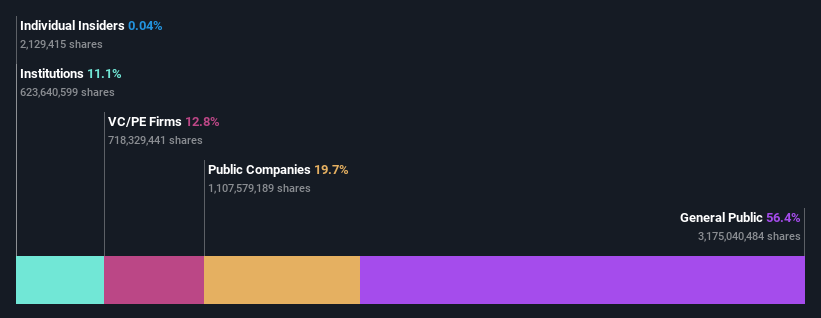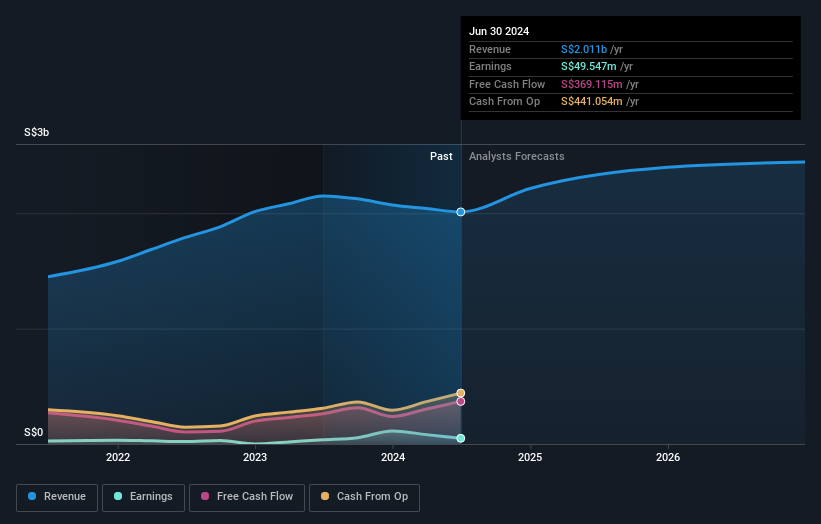Keppel Infrastructure Trust's (SGX:A7RU) biggest owners are individual investors who got richer after stock soared 3.3% last week

Key Insights
- Significant control over Keppel Infrastructure Trust by individual investors implies that the general public has more power to influence management and governance-related decisions
- The top 25 shareholders own 40% of the company
- Institutional ownership in Keppel Infrastructure Trust is 10%
To get a sense of who is truly in control of Keppel Infrastructure Trust (SGX:A7RU), it is important to understand the ownership structure of the business. We can see that individual investors own the lion's share in the company with 52% ownership. Put another way, the group faces the maximum upside potential (or downside risk).
As a result, individual investors were the biggest beneficiaries of last week’s 3.3% gain.
In the chart below, we zoom in on the different ownership groups of Keppel Infrastructure Trust.
See our latest analysis for Keppel Infrastructure Trust

What Does The Institutional Ownership Tell Us About Keppel Infrastructure Trust?
Many institutions measure their performance against an index that approximates the local market. So they usually pay more attention to companies that are included in major indices.
As you can see, institutional investors have a fair amount of stake in Keppel Infrastructure Trust. This can indicate that the company has a certain degree of credibility in the investment community. However, it is best to be wary of relying on the supposed validation that comes with institutional investors. They too, get it wrong sometimes. If multiple institutions change their view on a stock at the same time, you could see the share price drop fast. It's therefore worth looking at Keppel Infrastructure Trust's earnings history below. Of course, the future is what really matters.

We note that hedge funds don't have a meaningful investment in Keppel Infrastructure Trust. Keppel Ltd. is currently the company's largest shareholder with 18% of shares outstanding. In comparison, the second and third largest shareholders hold about 12% and 2.4% of the stock.
Our studies suggest that the top 25 shareholders collectively control less than half of the company's shares, meaning that the company's shares are widely disseminated and there is no dominant shareholder.
While studying institutional ownership for a company can add value to your research, it is also a good practice to research analyst recommendations to get a deeper understand of a stock's expected performance. There is a little analyst coverage of the stock, but not much. So there is room for it to gain more coverage.
Insider Ownership Of Keppel Infrastructure Trust
While the precise definition of an insider can be subjective, almost everyone considers board members to be insiders. Management ultimately answers to the board. However, it is not uncommon for managers to be executive board members, especially if they are a founder or the CEO.
Insider ownership is positive when it signals leadership are thinking like the true owners of the company. However, high insider ownership can also give immense power to a small group within the company. This can be negative in some circumstances.
Our data suggests that insiders own under 1% of Keppel Infrastructure Trust in their own names. It is a pretty big company, so it would be possible for board members to own a meaningful interest in the company, without owning much of a proportional interest. In this case, they own around S$990k worth of shares (at current prices). Arguably, recent buying and selling is just as important to consider. You can click here to see if insiders have been buying or selling.
General Public Ownership
The general public -- including retail investors -- own 52% of Keppel Infrastructure Trust. This level of ownership gives investors from the wider public some power to sway key policy decisions such as board composition, executive compensation, and the dividend payout ratio.
Private Equity Ownership
Private equity firms hold a 12% stake in Keppel Infrastructure Trust. This suggests they can be influential in key policy decisions. Some investors might be encouraged by this, since private equity are sometimes able to encourage strategies that help the market see the value in the company. Alternatively, those holders might be exiting the investment after taking it public.
Public Company Ownership
It appears to us that public companies own 18% of Keppel Infrastructure Trust. We can't be certain but it is quite possible this is a strategic stake. The businesses may be similar, or work together.
Next Steps:
It's always worth thinking about the different groups who own shares in a company. But to understand Keppel Infrastructure Trust better, we need to consider many other factors. Take risks for example - Keppel Infrastructure Trust has 3 warning signs (and 1 which makes us a bit uncomfortable) we think you should know about.
If you are like me, you may want to think about whether this company will grow or shrink. Luckily, you can check this free report showing analyst forecasts for its future.
NB: Figures in this article are calculated using data from the last twelve months, which refer to the 12-month period ending on the last date of the month the financial statement is dated. This may not be consistent with full year annual report figures.
Valuation is complex, but we're here to simplify it.
Discover if Keppel Infrastructure Trust might be undervalued or overvalued with our detailed analysis, featuring fair value estimates, potential risks, dividends, insider trades, and its financial condition.
Access Free AnalysisHave feedback on this article? Concerned about the content? Get in touch with us directly. Alternatively, email editorial-team (at) simplywallst.com.
This article by Simply Wall St is general in nature. We provide commentary based on historical data and analyst forecasts only using an unbiased methodology and our articles are not intended to be financial advice. It does not constitute a recommendation to buy or sell any stock, and does not take account of your objectives, or your financial situation. We aim to bring you long-term focused analysis driven by fundamental data. Note that our analysis may not factor in the latest price-sensitive company announcements or qualitative material. Simply Wall St has no position in any stocks mentioned.
About SGX:A7RU
Average dividend payer slight.
Market Insights
Community Narratives



